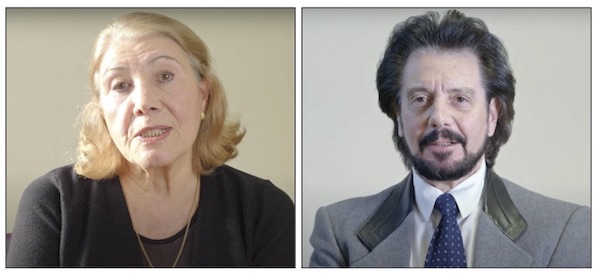Zanna Linskaia and Rudy Rozanski were key in making the video Burquest Jewish Community: Past, Present, Future, which is available on YouTube. (screenshots)
Burquest Jewish Community, which serves people in the eastern suburbs of Vancouver, turns 50 next year. Whether that milestone is marked by a major celebration or not, a recently released video provides a permanent commemoration of the impact the group has had on individuals and Jewish life in the area. The film premièred at an event June 25.
Zanna Linskaia, a former Burquest board member and longtime force of nature in the community, had the idea of making a permanent, easily viewable history of the community and she got the support of the organization’s board. She recruited Rudy Rozanski, Burquest’s then-president, to work with her to get the project done.
They collected archival materials, old photos, newspaper clippings and historical artifacts, and identified people to interview on camera to help tell the story. A valuable find was video footage of Burquest members taken two decades ago by Jelena Fuks and longtime member and past president Dov Lank. They also hired filmmaker Lior Noyman.
Linskaia and Rozanski have several lifetimes of creative achievement between them.
“I was always a huge fan of Zanna,” Rozanski told the Independent. “I had the great honour to arrange a few of her songs and do some performances with her and so I knew she’s a composer, a writer, a poet … probably the most amazing woman I’ve ever known.”
In addition to all that, Linskaia, a journalist by background (she once wrote the Russian-language page in the Jewish Independent’s predecessor, the Jewish Western Bulletin) and a Coquitlam resident for two decades, retired in 2020 as a seniors outreach counselor for Jewish Family Services. Rozanski is a classical pianist and teacher, with a PhD in musicology. He has lived in Coquitlam for 30 years.
Through interviews with a host of longtime members – including two founding originals, Bill Gruenthal and Max Jacobson (who, sadly, died Aug. 18) – the video sets the stage by indicating how remote many suburban Jews felt from the geographic heart of the community half a century ago.
Gruenthal recalled reading the Jerusalem Post on the bus headed for Kootenay Loop those many decades ago and a fellow passenger leaned over to ask if he was “a member of the tribe.” It was Jacobson.
“Max and I have been friends ever since,” Gruenthal says in the film.
A few intrepid people plodded through the old Jewish phone book and called anyone who lived in Burnaby, New Westminster, Coquitlam and surrounding areas. A living room meeting was held in 1974, with a few more than a dozen attendees. A lawyer volunteered to shepherd the nascent group into legal existence and Jacobson became founding president.
A year later, they formed a supplementary school for kids in the community, and Burquest became a gathering place for holidays and simchas. But they were meeting mostly in private homes. They raised some money, with the support of the late Morris J. Wosk, the Diamond Foundation and other philanthropists, and hired an architect to design a purpose-built shul and community centre. But the plan wasn’t feasible and it was decided to buy an existing building instead. Gruenthal’s son-in-law was in the mortgage sector and helped the society purchase a Jehovah’s Witnesses building in Coquitlam that has served ever since as Burquest’s locus for Shabbat and holiday celebrations, classes, kids programs, seniors lunches and a raft of other activities. Visiting rabbis, including Rabbi Yosef Wosk, have led holiday services over the years. Cantor Steve Levin has been Burquest’s spiritual leader for more than two decades.
Current and past members speak in the video about the impact Burquest has had on them and their families.
“Some of the most emotional and connected experiences we had with Judaism were when we were at Burquest,” recalls Shelley Rivkin. Stewart Levitt talks about the number of intermarried families or families with converted members and how they were welcomed.
The film, Burquest Jewish Community: Past, Present, Future, is available on YouTube. The musical score is an original creation by Rozanski.
“I ended up improvising some of [the music] on the spot as we were editing and we went through the entire film and edited it scene by scene,” he said.
At the wine-and-cheese reception before the première screening, Rozanski performed the entire score, accompanied by Arnold Kobiliansky on violin.
“The music [in the film] gets cut up and only specific parts are used,” said Rozanski, “so we wanted to present the film music almost as a score, so they could hear the entire music as it unfolds … and then they would be able to recognize it in the film.”
The film project, a labour of love, was a major undertaking.
“We are not going to do a second film,” Linskaia said with a laugh.
“We both felt this was really important,” said Rozanski. “I realized immediately what an important gift this was to Burquest and to future generations. It really is our gift and we put our heart into this. We understand nothing is perfect, of course, but we really did our best with it.”
For Linskaia, the film is a tribute to the centrality of the community in her life.
“Burquest became my Jewish home,” she said.

